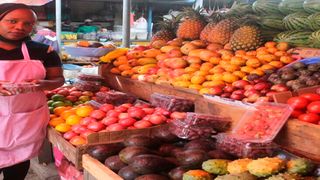
Ms Alice Mwithaga, a fruit vendor, at her stall in Top Market, Nakuru Town in this picture taken on September 17, 2021.
| John Njoroge | Nation Media GroupEnterprise
Premium
Covid wipes out over a third of SMEs in Kenya
What you need to know:
- Many businesses closed down and clients disappeared, with efforts to keep them afloat eating into owners’ savings.
- The report also notes that business closures had risen in the five months between March and July this year.
The Covid-19 pandemic wiped out over a third of all businesses in Kenya, threatening the existence of micro and small enterprises (MSE), which constitute 98 per cent of the economy.
The latest study on the impact of the pandemic on businesses employing between one and nine people paints the most authentic picture of the suffering in the sector.
Many businesses closed down and clients disappeared, with efforts to keep them afloat eating into owners’ savings and disrupting household budgets, leaving many starving.
The Finaccess MSE Covid-19 Tracker Survey, released yesterday by the Central Bank of Kenya (CBK), tracked more than 600 businesses between February 2020 and July 2021.
It found that 35 per cent of the enterprises that were active in February 2020 had closed down by July this year.
MSEs are small businesses owned by Kenyans of low means, such as shops, vegetable (vibanda) shops, salons and small eateries, which form a lifeline for their founders and workers. They employ less than 10 people.
“In July 2021, 38 per cent of micro businesses had recovered, with average revenues at the same level or higher than pre-Covid; but the majority (62 per cent) are still earning less than their pre-Covid revenues,” the report says.
Business closures
“Meanwhile, business closures increased in 2021, with 35 per cent of business owners who had businesses pre-Covid no longer involved in any business activity in July 2021.”
The report also notes that business closures had risen in the five months between March and July this year, with an increasing number of entrepreneurs considering 2021 a worse year than 2020 due to reduced clients.
It is the first official record of the impact of Covid-19 in Kenya’s informal sector.
By November 2020, only 11 per cent of the businesses thought 2021 would be worse for them, and that number rose to 28 per cent by March this year, and 34 per cent by July. Those who thought this year would be better for business reduced from 55 per cent to 51 per cent.
“Reduced customer demand is still the biggest challenge facing business owners, (but) fewer business owners cited this as a challenge in July 2021 compared to Nov 2020,” the report notes.
By July, 37 per cent of business owners considered reduced customer demand a challenge while six per cent considered business expenses as the challenge.
The report also observes that resilience in the small businesses has declined by nearly half due to the pandemic, as many business owners were forced to dip into their savings when the pandemic affected their cash flow.
Dwindling revenues
“In July 2021 only 32 per cent of MSEs claimed to have savings, down from 60 per cent in February 2020 (pre-Covid). There has been little recovery since then,” the report says.
The 32 per cent savings as of July was the lowest in the Covid-19 period and is down from 37 per cent recorded in March this year.
The report also notes that revenues for small businesses are still largely below pre-Covid levels, with 62 per cent of the enterprises by July earning less than they earned before the pandemic. As of July 2021, most of the businesses were earning 67 per cent of their pre-Covid revenues.
Revenues for the businesses were lowest between April and July last year, when they averaged 37 per cent of the February 2020 levels.
Finding themselves with nowhere to turn when the pandemic struck, containment measures were issued, people lost jobs and customers disappeared, many business owners found themselves unable to provide for their families.
The report established that by July 2021, almost half (47 per cent) of MSE households missed meals, compared to 14 per cent in February 2020.
The report also reveals that the sector is still in the woods, with business owners still largely pessimistic.
“The biggest challenge cited by MSEs was reduced customer demand - 37 per cent of MSEs, followed by inability to meet business expenses - 6 per cent of MSEs,” the report observes.
Unregulated businesses
“In July 2021, the median number of customers reported by business owners was 50 per cent of the customer numbers they reported in February 2020.”
The Kenya National Bureau of Statistic (KNBS), in its 2016 MSME survey, found that most of the small businesses are unregulated, with 65 per cent operating without licences and 92 per cent not registered with the registrar of companies, meaning data on them is lacking.
During the current survey, only 347 of the 603 business owners who started the study could be traced to provide information up to July.
The report says that faced with the challenges, many MSEs have innovated by digitising business payments and increasing the use of digital marketing channels.
“The main shift to the use of mobile money for business transactions happened in pre-Covid, but adoption is still increasing, thereby improving the visibility of MSEs,” the report says, noting that many small businesses still largely use phone calls and SMS to market their products.
By July 2021, 30 per cent of the MSEs used phone calls and SMS for marketing and selling, 13 per cent through social media, but none had an online store or website. Marketing through social media was the highest by July 2021, compared to the periods before.
“(Some) 70 per cent of micro business owners in July 2021 said that they were accepting digital payments, up from 59 per cent in February 2020,” the report says.





